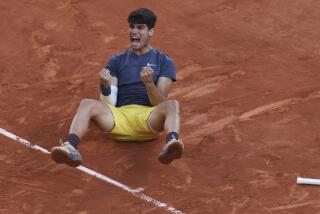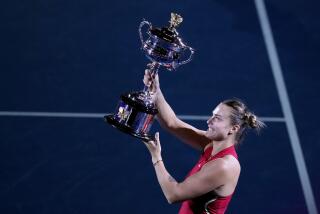Hingis Commands the Court in Return
MELBOURNE, Australia — Martina Hingis walked a few paces behind her opponent Vera Zvonareva through the corridor on their way out to the main show court.
Hingis was smiling.
After 65 minutes, she was still doing the same and then some, having dismantled Zvonareva, 6-1, 6-2, in stunning fashion, shredding the Russian’s shaky psyche with a nearly flawless display of thoughtful, all-court tennis in the first round at the Australian Open on Tuesday.
Her sheer pleasure at being back in the spotlight, playing a Grand Slam tournament for the first time since 2002, seemed almost contagious at Rod Laver Arena (of course, not for those in the Zvonareva camp). Whether it was a well-paced volley or a clever drop shot, her thrilled-to-be-back enthusiasm was shared by most of the spectators.
“It was beautiful to walk in there,” said Hingis, a wild-card entrant here. “So many memories coming back here, thinking about all the previous years.”
This venue is like a second home for the 25-year-old Swiss player, who won three singles titles here and reached three other finals at Melbourne Park, the last one in 2002. This was the third tournament of her 2006 comeback, after she left the sport in late 2002 because of injuries to her feet.
And it was her most efficient performance so far. Hingis never lost serve, saving three break points in the first game, and had 11 unforced errors overall, including four in the first set.
“This so far was the best match I’ve played since I came back,” she said. “I knew I had to come out like this. Because I just so badly didn’t want to lose first round.”
Zvonareva was an ideal foil. Though once ranked as high as No. 9 in the world, the young Russian is better known for creating a trail of tears around the court. Hingis will next play Emma Laine of Finland and could face No. 5 Mary Pierce of France in the third round.
Hingis came to the net 20 times, twice as often as Zvonareva, and at least one observer expects that to continue during her comeback journey.
“I think she has a very good sense of when there’s any kind of blood in the water,” ESPN commentator Mary Carillo said. “It’s like [Jimmy] Connors, when Connors got older, he played more at the net. He didn’t want to get in long rallies.
“Hingis knows that she’s got to make things happen as much as possible. When she left the game, she had gotten so defensive, playing from so far back. She’ll try not to let that happen.”
Melanie Molitor, Hingis’ mother and coach, apparently wasn’t quite ready to hand out A’s all across the board. Hingis called her after the match.
“She was really proud of me, that I played really well, strategically,” Hingis said. “But she always has some comments, ‘You could have done this. You should have done this.’ I’m like, ‘Please, I’m just happy to be through this.’ ”
Hingis would reveal no specifics.
“I’ll try to do it in the next match,” she said, smiling.
In the past, Hingis’ serve, especially her second delivery, was known to be vulnerable. She slightly altered the mechanics to pick up more power, but the Zvonareva match wasn’t the stiffest test for the shot.
“Easy to hit good second serves up a set and 4-1,” said top-seeded Lindsay Davenport. “We’ll see against the better players who are taking advantage of it early on. ... That was a shot at 4-4 or 5-5, you knew that it was just going to get in. Saying that, too, a lot of times with her first serve, she would just try and get it in. We’ll see when it’s a big point if she’s able to come up with the big serves, which she might be able to.”
Davenport today received her first real test at the tournament, defeating Karolina Sprem of Croatia, 7-6 (4), 6-3, in the second round. Davenport, who rallied from a 1-3 deficit in the tiebreaker, has not lost a set to Sprem in four matches.
Defending champion and 13th-seeded Serena Williams, who needed three sets to win her opening match, had little trouble today, beating Camille Pin of France, 6-3, 6-1, in 49 minutes.
On the men’s side, No. 2 Andy Roddick easily handled Wesley Moodie of South Africa, 7-5, 6-3, 6-2 in the second round.
The surprise was the exit of No. 13 Robby Ginepri, the U.S. Open semifinalist, who squandered a 6-2, 7-5, 3-0 lead against 24-year-old left-hander Denis Gremelmayr, a German qualifier playing in his first Grand Slam.
Gremelmayr had never played a five-set match but won this one, 2-6, 5-7, 6-4, 6-3, 6-3, securing the final service break when Ginepri played a shaky game at 3-4, missing a smash wide and netting a routine forehand volley on break point. Gremelmayr will play Marcos Baghdatis of Cypress next.
Ginepri was unavailable for comment afterward, and the German player was so exhausted he couldn’t find the words in English to answer a question about his incredible comeback.
“After two sets, I couldn’t feel my legs anymore,” he told German reporters. “I was very tired. After I got the break for 2-3 in the third set, I decided, ‘Shut off your brain and just run and try everything you can.’ And that worked.”
He said he thought so little of his chances that he had not booked a hotel room past today. One German reporter suggested, jokingly, that he ask Ginepri for his room.
More to Read
Go beyond the scoreboard
Get the latest on L.A.'s teams in the daily Sports Report newsletter.
You may occasionally receive promotional content from the Los Angeles Times.











